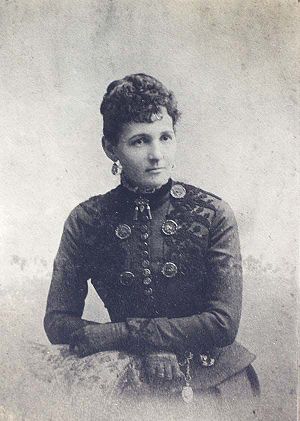Dr. Ellen Lawson Dabbs. Image from the From the Texas State Historical Association.
Dr. Mary Ellen Lawson Dabbs
Born: 1853 in Rusk County
Died: 1908
Noted for: Ellen Lawson Dabbs is noted as one of the earliest woman physicians in Texas, as well as a suffrage leader and champion for women’s rights and other social reforms.
Growing up the only girl in a large family of boys, Ellen Lawson Dabbs was known for excelling in school and participating in many of the same activities as her brothers.
These early displays of independence, drive, and willingness to buck convention were foreshadows of Ellen’s later life as a teacher, single mother, domestic abuse survivor, businesswoman, woman physician, newspaper publisher, suffrage leader, and social reform writer. Let’s take a look at a few of the ways this pioneering champion for equal rights made a difference for Texas women:
She was a doctor in an era when most women didn’t or couldn’t pursue higher education.
After graduating as valedictorian from the Furlow Masonic College in Georgia, Ellen later completed studies at the College of Physicians and Surgeons in Indiana and became a doctor. She was the first woman member of the North Texas Medical Society, authored an important paper on early onset diabetes, advocated for increased access to birth control, and spoke out about the need to curtail sexually transmitted diseases.
She helped create the first woman’s suffrage society in Texas.
In 1893, Ellen was a leader in the group of women who formed the Texas Equal Rights Association, the state’s first women’s suffrage society. The organization quickly spread to cities across Texas and laid the foundation upon which later suffrage groups would build.
Ellen also advocated for African-American women’s suffrage, a bold position since the Texas suffrage movement was deeply segregated.
In 1893, Ellen organized a Women’s Congress at the State Fair of Texas.
The event ran for six days and featured multiple speakers, including Ellen herself. Presentation topics included suffrage, politics, and women’s role in the church.
She fought conventional notions about gender stereotyping.
The social changes of the Industrial Age meant that people were beginning to reconsider traditional notions about gender. Ellen capitalized on this by promoting the radical notion that differences between the sexes didn’t spring from women’s inferiority, but rather from restrictive socialization that began at birth, women’s lack of access to education, and limited opportunities for employment and careers.
She helped establish Texas Woman’s University.
To get the ball rolling, Ellen first called for the creation of a co-ed admission policy at Texas A&M University. That wouldn’t happen for a long time, but this initial effort was the starting point for a public policy discussion that led to the creation of the state’s first industrial school for women, which would later become Texas Woman’s University. The school offered a practical education that focused on vocational and domestic training for young women, but soon expanded to include coursework in the liberal arts, fine arts and sciences.
Additional Reading:
A Woman of the Century: A Crowdsourcing Project of the 19th and 21st Centuries
“Texas Women: Their Histories, Their Lives” by Elizabeth Hayes Turner, Stephanie Cole and Rebecca Sharpless

